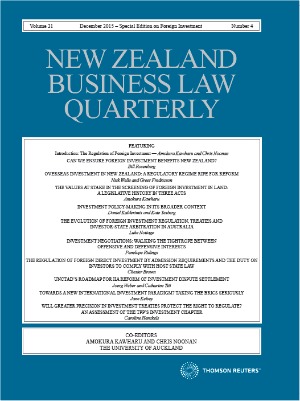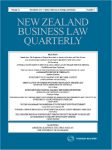New Zealand Business Law Quarterly - the special national and international regulation of foreign investment edition
The New Zealand Business Law Quarterly (NZBLQ) Volume 21 Number 4, December 2015 was a special edition covering the national and international regulation of foreign investment.
 It contains an introduction from the co-editors Amokura Kawharu and Chris Noonan: The Regulation of Foreign Investment, and ten articles. Most of the articles were first presented as draft papers at a roundtable meeting of scholars hosted by Auckland Law School in June 2015. Their titles, authors, and an abstract from three of them, are below.
It contains an introduction from the co-editors Amokura Kawharu and Chris Noonan: The Regulation of Foreign Investment, and ten articles. Most of the articles were first presented as draft papers at a roundtable meeting of scholars hosted by Auckland Law School in June 2015. Their titles, authors, and an abstract from three of them, are below.
We have also included the opening paragraph from the introduction.
Introduction: The Regulation of Foreign Investment by Amokura Kawharu and Chris Noonan, Associate Professors, Auckland Law School, University of Auckland
This special issue of the Quarterly contains a series of articles addressing various aspects of the national and international regulation of foreign investment. In New Zealand, the centrepiece national regulation of foreign investment is the Overseas Investment Act 2005, which sets up a screening regime for foreign investments in “sensitive land” and “significant business assets”. Despite ongoing reform of the Act (and associated regulations), it remains in an inchoate state. For example, new provisions were introduced in 2009 after a review to address mounting concerns over the effects of aggregation and corporatisation of farms under foreign control. The new provisions are only expressed in general terms, conferring a wide discretion on decision-makers to approve or reject investment proposals. It is unclear from the final text of the amendments just what the underlying purpose of the reforms was. Other issues include the lack of coherent regulation of foreign investment in strategic assets, and the lack of specific screening mechanisms for sensitive sectors. The monetary threshold for screening business assets is being increased progressively over time, without any public discussion.
The ten articles
1. Can We Ensure Foreign Investment Benefits New Zealand?
by Bill Rosenberg, Economist and Director of Policy, New Zealand Council of Trade Unions
2. Overseas Investment in New Zealand: A Regulatory Regime Ripe for Reform
by Nick Wells, Partner, Chapman Tripp and Greer Fredricson, Senior Associate, Chapman Tripp
3. The Values at Stake in the Screening of Foreign Investment in Land: A Legislative History in Three Acts
by Amokura Kawharu, Associate Professor, Auckland Law School, University of Auckland
Article abstract
The aim of this article is to assess whether and to what extent the objectives of New Zealand’s regime for screening foreign investment in land include protecting cultural and heritage values associated with land ownership and use. This assessment takes place against a backdrop of proposals to reform investment screening to promote New Zealand’s economic interests. The article examines the policy arguments and Parliamentary debates relating to the three principal Acts (and the amendments to them) which have constituted the screening regime: the Land Settlement Promotion and Land Acquisition Amendment Act 1968, the Overseas Investment Act 1973, and the current Overseas Investment Act 2005. It concludes that the protection of cultural and heritage values is and has always been an important objective of screening foreign investment, and that therefore these values need to be addressed as part of any reform initiative.
4. Investment Policy-making in its Broader Context
by Daniel Kalderimis, Partner, Chapman Tripp, Wellington and Kate Yesberg, Senior Solicitor, Chapman Tripp, Wellington
5. The Evolution of Foreign Investment Regulation, Treaties and Investor-State Arbitration in Australia
by Luke Nottage, Professor of Comparative and Transnational Business Law, University of Sydney Law School, Australia
6. Investment Negotiations: Walking the Tightrope between Offensive and Defensive Interests
by Penelope Ridings, Barrister Sole
Article abstract
There has been increasing concern in recent years over the potential for investor-State dispute settlement (ISDS), negotiated as part of a free trade agreement (FTA), to straitjacket the actions of a future government. This article reviews New Zealand’s experience of ISDS and the various safeguards that New Zealand has negotiated in its international investment agreements, including the recently signed Trans-Pacific Partnership Agreement (TPP), to mitigate the perceived risks of ISDS. The broad range of negotiated safeguards shows that New Zealand has walked a fine line between its offensive interests as a potential source of foreign investment and its defensive interests in preserving the Government’s right to regulate.
7. The Regulation of Foreign Direct Investment by Admission Requirements and the Duty on Investors to Comply with Host State Law
by Chester Brown, Professor of International Law and International Arbitration, Faculty of Law, University of Sydney, Australia
8. UNCTAD’S Roadmap for IIA Reform of Investment Dispute Settlement
by Joerg Weber Head of Investment Policy Branch, Investment and Enterprise Division, UNCTAD, Geneva and Catharine Titi Research Scientist, French National Centre for Scientific Research (CNRS); Member of the CREDIMI, Law Faculty of the University of Burgundy
9. Towards a New International Investment Paradigm? Taking the BRICs Seriously
by Jane Kelsey, Professor of Law, University of Auckland
Abstract Abstract
International investment arbitration (IIA) faces a crisis of legitimacy. The United Nations Conference on Trade and Development has identified four pathways that states are exploring in response: maintaining the status quo; disengaging from the regime; introducing selective adjustments; and engaging in systematic reform. States’ responses have largely aligned to their development status. This article locates the challenge to IIA within two broader critiques of international economic law. One perspective, from the global North, treats the investment regime as part of a troubled neoliberal paradigm that is politically and socially unsustainable. The second, from the global South, views investment treaties as a legacy of colonialism and imperialism and imbued with power asymmetries that are endemic and inescapable. That leads to the question examined here of whether large and ascending powers known colloquially as the BRICs can act as catalysts for a new architecture and normative framework for the international investment regime, one that rebalances power relations between state, society and capital, and between the global North and South. Three of the BRICs — Brazil, South Africa and India — have recently developed alternative forms of investment instruments through treaties and domestic legislation. They vary in their priorities and their radicalism. A comparison of four features — the reassertion of state authority, core investment protection rules, the balance between investor rights and social and development objectives, and the dispute settlement mechanism — shows it is technically and politically possible to create a new architecture for investment instruments that rebalances priorities and power. Whether they can help catalyse a systemic change to the IIA regime remains to be seen.
10. Will Greater Precision in Investment Treaties Protect the Right to Regulate? An Assessment of the TPP’s Investment Chapter by Caroline Henckels, Senior Lecturer, Faculty of Law, Monash University, Australia
About NZBLQ
 The New Zealand Business Law Quarterly (NZBLQ) is New Zealand’s leading business law journal. The NZBLQ aims to provide in-depth, but accessible, analyses of business law issues for both a national and international legal audience. It is a fully refereed journal, with material submitted by academics, from New Zealand and abroad, and by practising lawyers. Published four times per year, it is available in hard copy and online.
The New Zealand Business Law Quarterly (NZBLQ) is New Zealand’s leading business law journal. The NZBLQ aims to provide in-depth, but accessible, analyses of business law issues for both a national and international legal audience. It is a fully refereed journal, with material submitted by academics, from New Zealand and abroad, and by practising lawyers. Published four times per year, it is available in hard copy and online.
For more information
- Visit our estore: New Zealand Business Law Quarterly (NZBLQ)
- Or talk to your account manager or call Customer Service 0800 10 60 60